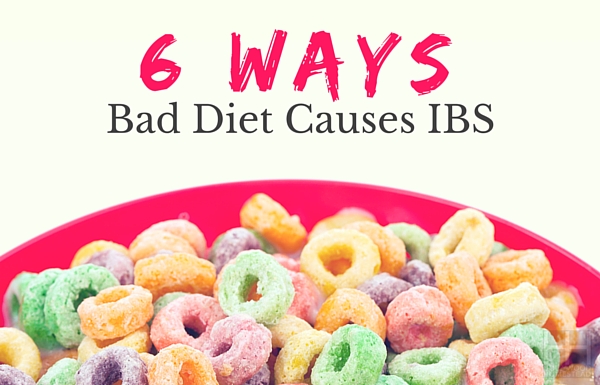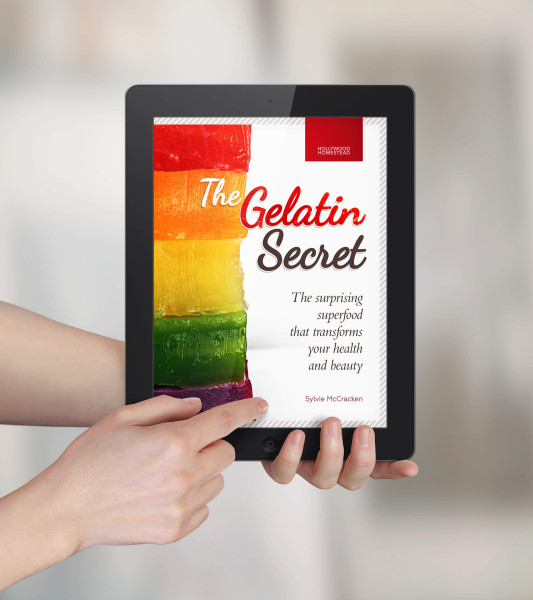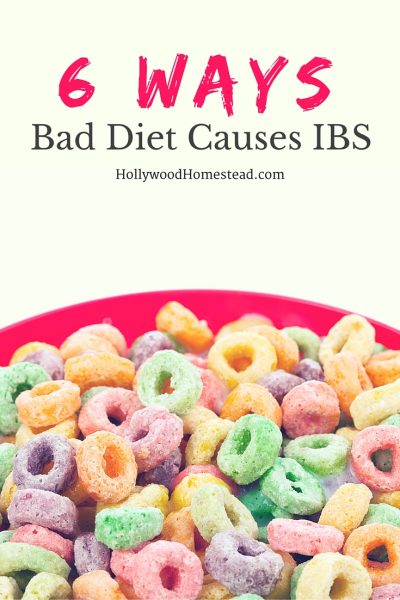
It is obvious that diet has a big role in IBS. The disorder was virtually unheard of in the past, and now prevalence is skyrocketing in Western countries. As many countries start to adopt Western-style diets of processed foods laden with preservatives and added sugars, they too have seen a spike in IBS. But what exactly is it about our diet which is causing IBS? Like with everything about this disorder, there are likely numerous factors of our diet which contribute to IBS. Here I will talk about the 6 main diet issues which could be causing your IBS.
Low Fiber and IBS
As I talk about in this post, our gut flora (which consists of about 100 trillion bacteria) is very important to our health. Now, these bacteria in our guts are living things and, like all living things, they must eat something to survive. Some bacteria which live in the colon primarily eat fiber. When they consume the fiber, they produce nutrients which nourish the cells lining the colon. This is just one example of the mutually-beneficial relationship we have with our gut bacteria.
What happens to fiber-eating bacteria when we don’t consume enough fiber? Some of these bacteria die off. Without these bacteria, our gut flora becomes out of balance and “bad” bacteria can start to grow out of control. This leads to SIBO, which could be the real cause of your IBS. Read this post for more on the link between IBS and SIBO.
Not all bacteria switch off when they don’t get enough fiber though. Some bacteria switch to another food source: the lining of your gut! As they devour your gut, it can eventually cause severe damage to the nerves lining the gut. The damaged gut nerves are unable to communicate with the body, which leads to motility problems and IBS. (Source)
Since low fiber causes this problem, you can just add more fiber to your diet to fix it – right? It turns out that the solution isn’t that simple. When you stop consuming a type of food such as those rich in fiber, your levels of those bacteria decrease. When you then do consume some fiber-rich foods, your body is unable to digest them properly and you get GI symptoms. This is one reason why people with IBS experience reduced symptoms on the low FODMAPs diet which excludes certain types of carbohydrates and fibers in the process.
When you exclude carbs and fibers from your diet, you might experience reduced symptoms. But, over the long term, the risks can outweigh the benefits because you are starving your gut bacteria!
It turns out that our bodies need these fermentable carbs to keep the gut healthy. More specifically, the bacteria produce short chain fatty acids (primarily acetate, butyrate, propionate) which serve to reduce inflammation and nourish the gut lining. Fermentation also produces organic acids and hydrogen, which help maintain a proper pH in the gut. With less fermentation taking place, the gut will become less acidic.
Certain “bad” bacteria thrive in the less acidic environment, including strains of E. Coli, Salmonella, Vibrio, and Helicobacter. This last one, you might know, is associated with GERD and gastric cancer. These bad bacteria can inflict damage on the gut which leads to nerve damage and IBS. (Source 1)
Here is an overview of how it might look:
Low amounts of carbs and fibers in diet ->
Less energy for microbes ->
Microbes die off ->
Less fermentation occurs ->
Fewer fermentation byproducts such as short chain fatty acids ->
Low pH environment ->
Bad bacteria thrive ->
Gut damage ->
IBS and other GI conditions
If a low-fiber diet is the underlying cause of your IBS, you won’t just be able to eat a lot of high-fiber foods since the healthy bacteria in your gut which rely on them have likely already depleted in population. You will have to completely reset your gut bacteria, which we will talk about in later posts in this series.
Excess Dietary Sugar and IBS
For a long time, we’ve known that consuming lots of sugar is linked to a huge range of health diseases with obesity being the most obvious one. Previously, it was thought that sugar’s bad effects were mostly due to it causing our blood sugar levels to spike, which leads to the sugar being stored as fat and a decrease in insulin sensitivity. Now, researchers have evidence that excess sugar intake disrupts our gut flora.
Of the 100 trillion bacteria living in our guts, they can be broken into 3 basic types. One type prefers to eat proteins, the other type prefers carbs (including sugars), and the third type prefers a mix of both. (Source) When you eat a diet high in sugar, you are causing a surge in the sugar-loving bacteria. This can result in an unbalanced gut flora which leads to problems like SIBO, motility issues, and IBS symptoms.
Most of the super sugary foods in the Standards American Diet are completely devoid of any nutrients. So, not only are you disrupting your gut flora, but you are depriving your gut of the nutrients it needs to stay healthy and rebuild its lining.
There hasn’t been much research into the effects of sugar consumption on IBS symptoms, but studies do show how excess sugar – and the gut dysbiosis it causes – can lead to severe health issues well beyond obesity. For example, a study conducted by researchers at Oregon State University found that mice fed a high-sugar diet experienced changes to their gut bacteria which impacted their cognitive abilities. The headline? Eating sugar makes you stupid
Even more worrisome is the growing body of evidence which shows that artificial sweeteners (which people commonly use to reduce their calorie consumption) harm gut flora. Studies show that artificial sweeteners like aspartame, sucralose and saccharin change the population of gut bacteria so the bacteria are no longer effective in turning energy into fuel. So, ironically, those artificial sweeteners which people use to lose weight are actually contributing to obesity. (Source)
Chemicals in Food and IBS
It is no secret that supermarket food is loaded with chemicals like preservatives and additives. All you have to do is pick of box or can from the shelf and read the ingredient list. You will likely see a long list of weird chemical ingredients. Even foods which have no ingredients list – such as fresh veggies and fruits – are almost always sprayed with pesticides and grown with chemical fertilizers. It is really difficult to eat 100% organic, but this is something we should all strive for, especially if you have IBS.
There is now a growing body of research which shows that these chemical additives affect our gut flora. In this study, for example, researchers found that rats who consumed emulsifiers had less diversity in their guts than the control rats who didn’t consume emulsifiers. The researchers also suspect that the emulsifiers can break down the lining of the gut, which could result in gut problems by preventing bacteria from coming in contact with the gut.
Food Sensitivities and IBS
If you look through IBS forums, you will find a lot of talk about gluten and many people claiming that they were able to reduce their symptoms by going on a gluten-free diet. There are also some studies which show that going on a gluten-free diet can reduce symptoms of IBS. The reason for this has to do with the fact that gluten is a common food sensitivity. (Source) Other common food sensitivities include milk (lactose), eggs, and nuts.
A food sensitivity is any food which irritates the digestive tract. If we were to just eat these foods some of the time, our guts would be able to heal. However, the Standard American Diet consists almost solely of these irritating foods. Over time, tears can occur in the gut. These tears might damage nerves, which leads to IBS. The irritation caused by food sensitivities can also cause inflammation, which leads to holes in your gut and Leaky Gut.
When you have Leaky Gut, undigested particles of food can escape into your bloodstream. Your body then sends out its “armies” to destroy the foreign invaders. Unfortunately, some of these particles of food resemble our own tissues. The immune system can get confused and start to attack itself, leading to autoimmune diseases. I talk about this a lot in my ebook The Gelatin Secret, and how gelatin can be used to heal the damage done to your gut.

Fluoride and IBS
In 1945, Grand Rapids, Michigan became the first city in the world to add fluoride to their drinking water in an attempt to reduce dental carries. Now, less than a century later, more than 200 million people in the United States alone have fluoridated water and 13 million schoolchildren participate in school programs that encourage a fluoride rinse. (Source)
The evidence to whether this fluoride is really helpful in preventing cavities is controversial. However, there is undeniable evidence that the fluoride is affecting our health in other ways.
When fluoride is consumed, such as through fluoridated drinking water or swallowed toothpaste, the prime site of interaction is the epithelium cells of the gut and its flora.
Even small amounts of fluoride in the stomach have been shown to form hydrofluoric acid, which leads to nausea, vomiting, and pains. In severe cases, fluoride ingestion can cause hemorrhaging in the gut – such as the case with one young body who had to have part of his stomach removed after consuming fluoride. The effect isn’t limited to the stomach. Fluoride can damage the lining of the gut, leading to IBS. (Source 1)
The primary symptoms of gut damage from fluoride are nausea, vomiting, and abdominal pain. (Source) If you have IBS, I’m sure these sound familiar!
Because fluoride damages the gut bacteria, it can also disrupt the endocrine system. The endocrine system regulates hormones.
As Professor Abderhalden, a leading biochemist, says of fluoride poisoning, most diseases are the result of disturbances to enzyme systems, and enzymes react to fluoride in different ways. Some enzymes are activated by fluoride whereas others are inhibited. For example, the lipase enzyme which is used for digesting fat is inhibited.
Research by Kings College in London found that fluoride forms hydrogen bonds with certain amino acids, and that this can lead to chromosomal damage. The immune system will no longer recognize the damaged chromosome and attack it. This can trigger an allergic reaction or gastrointestinal problems. (Source)
Unfortunately, virtually no one has bothered to monitor whether GI symptoms increased after initiating water fluoridation. (Source)
It isn’t just fluoride which is a problem with our drinking water. Cities use chlorine to treat water, and chlorine is also known to affect gut bacteria. While there has been plenty of research on how chlorine affects bad bacteria, virtually no research has been done on how it affects our healthy gut bacteria. For example, one study on rats did find that chlorine disrupted their immune system, and immunity is linked to gut bacteria. (Source)
If you have IBS, now is the time to invest in a very good water filter to remove the fluoride, chlorine, and other harmful additives!
Mercury Poisoning and IBS
Upwards of 85% of Americans have at least one silver filling in their mouth, and these fillings contain about 50% mercury. Until recently, it was thought that the mercury in fillings didn’t pose a health risk. Now, dentists and health advisory boards are finally changing their position and saying that it is dangerous. Even one mercury filling manufacturer, The Caulk Company, now advises that its mercury products shouldn’t be used in children under 7, pregnant or lactating women, or people with kidney disease. (Source)
Actually, it is infuriating that we ever considered it okay to use mercury in fillings. We’ve known for a long time that mercury is highly toxic and even a small amount of mercury can cause severe health effects. The FDA had set upper levels of mercury content which were deemed “acceptable.” The problem is that these upper levels are the level at which most people start to show symptoms. It doesn’t account for all the people who will show symptoms at lower levels. It also doesn’t factor in all of the adverse effects which may be linked to mercury – including IBS.
There are several ways that mercury could cause IBS. Firstly, mercury is a very potent antimicrobial agent. When it gets into the body, it kills off bacteria and causes gut flora dysbiosis. Mercury can also cause mutations in intestinal bacteria, and these bacteria can then go on to damage the gut.
Further, mercury causes significant destruction of stomach and intestine epithelial cells. When these cells are damaged, it can then worsen gut dysbiosis and lead to problems like ulcers, Leaky Gut, and poor nutrient absorption. The situation is made worse because production of Secretory A (an antibody) is reduced. In a healthy gut, the gut will release Secretory A, which kills bad bacteria.
In the damaged gut, there is less Secretory A and bad bacteria are able to thrive even further. Mercury will also interfere with digestive enzyme production, and this can cause digestive issues like gas and bloating. (Source 1, 2, 3)
How does the mercury get into our body?
Over time, mercury gradually leaches out of the fillings. Substances such as acids in the mouth can cause the mercury to deteriorate even faster. The deteriorating mercury vapor is inhaled into the lungs where it then makes it into our bloodstream and travels into our organs and tissues. (Source)
As one dentist points out, we know that there is a direct correlation between the number of amalgam fillings in the mouth and the levels of mercury in the body tissues. Studies show that after 20 years, there is no more mercury left in fillings. Where did all of that mercury go if not into the body?
Replacement of amalgam fillings has been shown to reduce health disorders, including those related to bowel function. (Source)
I know that mercury amalgam fillings don’t really have anything to do with bad diet. But we also can get mercury poisoning from a variety of other sources, including many of the foods we eat. Here are just some of the ways that mercury gets into our bodies:
- Shellfish
- Tuna
- Grains treated with fungicides that contain methyl mercury
- Waterproof mascara
- Some hair dyes
- Preservatives found in some vaccines (Thimerosal)
- Hemorrhoidal medicines
- Yellow, vermillion and cinnabar paint pigments
- Mildew-resistant paints
- Gardening chemicals
- Fluorescent light bulbs
The bottom line?
IBS is a very complex disorder and there are likely numerous underlying factors which cause it. In addition to diet, IBS could be caused by food poisoning, antibiotic use, SIBO, and stress. But you can’t overlook the diet component of IBS. Now is the time to stop eating processed junk foods and focus on eating real foods. Not only could it cure your IBS, but your overall health will improve too.
Do you have IBS? Download our free guide 7 Things You Wish Your Doctor Told You About IBS.

Latest posts by Sylvie McCracken (see all)
- Treating H. Pylori (Part 3): What H. Pylori Does to the Body - August 8, 2022
- Treating H. Pylori (Part 2): How H. Pylori is Contracted - August 3, 2022
- Understanding Beef Labels: Organic, Pastured, Grass-Fed & Grain-Finished - July 25, 2022
